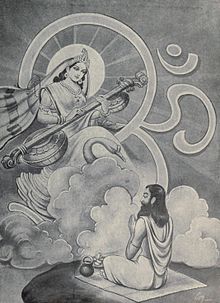Ancient Indian Education System
Ragadiduvramalavaipiam |
Chittam ni samsaramuvacha-vajri ||
"Says the teacher of vajra-yana:
The mind that has been tainted by the indelible impurities of passions, constitutes what is called Samsara or the world."
- Prajnopya-Vinischayasiddham
Ragadiduvramalavaipiam |
Chittam ni samsaramuvacha-vajri ||
"Says the teacher of vajra-yana:
The mind that has been tainted by the indelible impurities of passions, constitutes what is called Samsara or the world."
- Prajnopya-Vinischayasiddham
Prologue
One of the main feature of Ancient India is that it has been moulded more by religious influences than by political & economic considerations.
Image of Goddess Saraswati appearing before Sage Yajanvalkya.
One of the main feature of Ancient India is that it has been moulded more by religious influences than by political & economic considerations.
Image of Goddess Saraswati appearing before Sage Yajanvalkya.
Religion practically dominated every sphere of life in Ancient India. The total configuration of ideals, practices & conduct is called & #39; Dharma& #39; or moral law.
It was religion that gave its laws to social life & organization of Ancient Hindus & regulated their life in normal course.
In politics too, its influence has been profound from Ancient times till date.
In politics too, its influence has been profound from Ancient times till date.
From the very start ancient Indians conceived their country as less of geographical entity & more of cultural or spiritual possession.
Broadly speaking, the boundaries of this cultural entity was far greater than its geographical limits.
Broadly speaking, the boundaries of this cultural entity was far greater than its geographical limits.
The country to ancient Indians was a country of spirit, not confined to physical boundaries.
India thus, is the first country to rise to the concept of an extra-territorial nationality & became the home of different societies, each carrying its unique traditions & institutions.
India thus, is the first country to rise to the concept of an extra-territorial nationality & became the home of different societies, each carrying its unique traditions & institutions.
The political & social reality for Hindus cannot ever be confined to the limits of geography, but only culture.
Thus, from the very dawn of civilization, this Country of Spirit expanded into different names like Brahmavrata, Brahmarishidesa, Aryavrata, Jambudweepa, etc.
Thus, from the very dawn of civilization, this Country of Spirit expanded into different names like Brahmavrata, Brahmarishidesa, Aryavrata, Jambudweepa, etc.
This in fact is a & #39; Greater India& #39; which is beyond its geographical boundaries.
Nowhere is this distinctive tendency of Hindu thought is more manifest than in the sphere of education and learning.
Nowhere is this distinctive tendency of Hindu thought is more manifest than in the sphere of education and learning.
Learning in India, through the ages has been prized & pursued as a part of its dharma. It was thought as a means of salvation, as the means of attaining & #39;Moksa& #39; or & #39;Nirvana& #39;.
Ancient Indian Education is to be understood as the outcome of Indian theory of knowledge & a part of corresponding scheme of life and its values.
That scheme takes full account of the fact that Life includes Death & the two form the whole truth.
This gives a particular angle of vision, a sense of perspective in which the physical & spiritual values of life are clearly defined & strictly differentiated.
This gives a particular angle of vision, a sense of perspective in which the physical & spiritual values of life are clearly defined & strictly differentiated.
Of all the peoples of the world, a Hindu is the most impressed & affected by the fact that death is the central and an undeniable fact of life.
Therefore, he feels that he cannot take life seriously and scheme for it without a knowledge of the whole scheme of creation.
Thus, he devotes himself to study the fundamental truths of life & doesn& #39;t care about half-truths.
Thus, he devotes himself to study the fundamental truths of life & doesn& #39;t care about half-truths.
His one aim, is to solve the problem of death by achieving knowledge of the whole truth of which life & death are part and parcel.
He perceives that it is the individual that dies and not the whole or Absolute.
He perceives that it is the individual that dies and not the whole or Absolute.
Thus, the Individual must merge himself in the Absolute in order to attain Moksa , or to escape from change, decay and dissolution.
This Absolute is not subject to change. Individualism is death - a lapse from the Absolute.
Individualism results from the pursuit of objective knowledge, and this has to be stopped.
Individualism results from the pursuit of objective knowledge, and this has to be stopped.

 Read on Twitter
Read on Twitter



